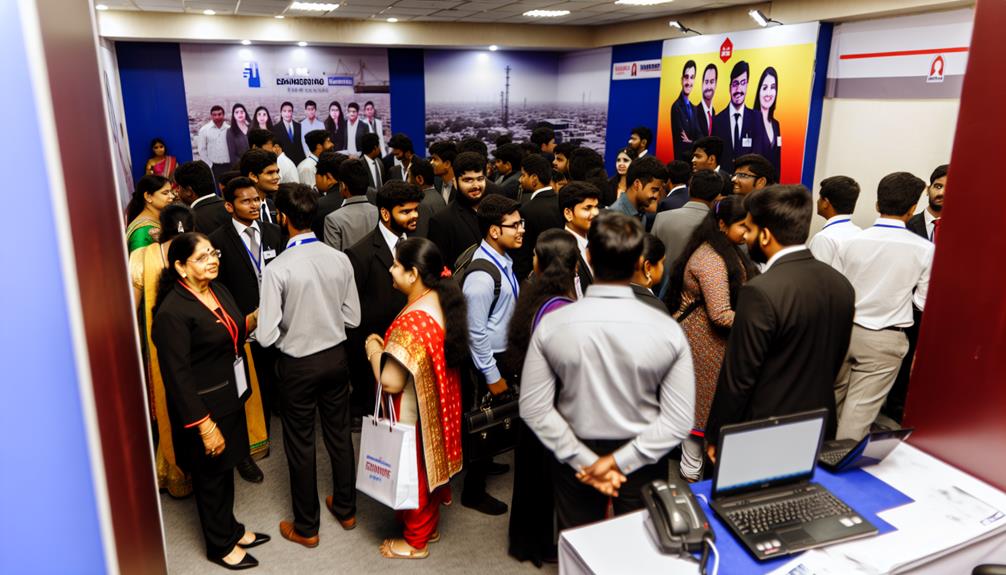How to Find Core Engineering Jobs in India
Finding core engineering jobs in India can feel like searching for a needle in a haystack—overwhelming and frustrating. But you don't have to navigate this complex landscape alone. By understanding the nuances of job markets, honing your skills, and adopting effective strategies, you can greatly improve your chances. So, what specific steps can you take to stand out, and how can networking play a pivotal role in your journey?
Key Takeaways
- Utilize job boards like Naukri.com and LinkedIn for job listings and alerts tailored to core engineering roles.
- Tailor your resume and cover letter to highlight relevant skills and experiences that match job descriptions.
- Engage in networking through professional associations and alumni networks to uncover job opportunities.
- Pursue internships and hands-on experiences to enhance your employability and practical knowledge in core engineering.
- Stay updated with industry trends and consider specialized courses or certifications to improve your skill set.
Understanding Core Engineering Roles
Understanding core engineering roles is essential for anyone looking to navigate the job market in this field. Core engineering encompasses various disciplines such as mechanical, civil, electrical, and electronics engineering. With around 3,000 job positions available in India, particularly in metropolitan hubs like Ahmedabad and Bengaluru, there's a significant demand for skilled professionals.
As you explore these opportunities, keep an eye on core engineering trends and industry innovations. Employers increasingly seek candidates who adapt to new technologies and methodologies. This means that staying updated on advancements in your specific area is critical. Proficiency in programming languages like C++ and Core Java, along with tools such as CAD software, can set you apart from other applicants.
Most core engineering roles require a relevant degree, with experience ranging from 1 to 13 years depending on the position. Companies are emphasizing continuous learning and skill enhancement, so consider investing in additional training or certifications to boost your employability. By understanding these roles and the skills needed, you'll be better positioned to seize the abundant opportunities in India's core engineering sector.
Key Skills and Qualifications

To land a core engineering job, you need to focus on essential technical skills and a relevant educational background. Mastering programming languages like C++ and Core Java, along with obtaining a Bachelor's degree in a related field, sets you apart from the competition. Additionally, staying updated with certifications and tools can boost your employability in this fast-paced industry.
Essential Technical Skills
Core engineering jobs in India demand a diverse set of technical skills that can make or break your chances of landing a position. Proficiency in programming languages like C++, Core Java, and ASP.NET is vital. Many roles also require a solid understanding of database management systems such as MySQL and RDBMS.
As companies increasingly prioritize candidates with knowledge of networking concepts and cloud infrastructure, you should familiarize yourself with these areas, especially if you're eyeing SDWAN roles. For mechanical engineers, expertise in CAD software is essential. Being adept in modeling tools like CREO, SolidWorks, and CATIA will set you apart.
Moreover, mastering advanced analysis techniques, including Computational Fluid Dynamics (CFD) and Finite Element Analysis (FEA), is essential. Strong analytical skills will help you tackle complex engineering challenges effectively. Don't forget the importance of continuous learning—enhancing your skills in specialized fields like powertrain NVH or biomechanics can greatly boost your employability.
Relevant Educational Background
A solid educational background is vital for securing core engineering jobs in India. Most positions require a bachelor's degree in core engineering fields such as mechanical, civil, electrical, or electronics. Choose your educational pathways wisely, focusing on degree specializations that align with your career goals.
Proficiency in relevant programming languages and software tools, like C++, Core Java, CAD software, or .NET frameworks, is highly sought after by employers. This technical knowledge not only enhances your skill set but also demonstrates your readiness for the challenges in the engineering sector.
Understanding project management methodologies, including Agile and Scrum, is essential, especially for technology and software development roles. Furthermore, internships and hands-on experience in core engineering projects greatly boost your employability, providing the practical knowledge recruiters value.
Lastly, commit to continuous learning. Obtaining relevant certifications in specialized areas such as CAD, CFD, or FEA can improve your career prospects and guarantee your skills align with industry demands. By strategically focusing on these aspects of your educational background, you'll be well-prepared to excel in the competitive landscape of core engineering jobs in India.
Job Market Insights

The core engineering job market in India is thriving, offering a wealth of opportunities across various sectors like mechanical, civil, electrical, and electronics engineering. Currently, around 3,000 positions are available, reflecting strong job market trends that align with industry demands. Importantly, there's been a 20% increase in campus placements for core engineering disciplines, signaling renewed interest from both students and employers.
Leading sectors such as auto, manufacturing, construction, and infrastructure management are actively hiring, particularly for candidates with specialized skills. This creates a competitive edge for you if you possess relevant qualifications. The median annual salary for mechanical engineers stands at approximately $90,000, with entry-level positions starting between $60,000 and $70,000, which highlights the attractive compensation landscape.
Moreover, the mechanical engineering job market is projected to grow by 4% from 2020 to 2030, translating to an estimated 20,000 annual job openings driven by retirements and workforce changes. By understanding these job market insights, you can better position yourself to seize the opportunities that await in the core engineering sector.
Effective Job Search Strategies

Maneuvering the job market can feel overwhelming, but implementing effective job search strategies can greatly enhance your chances of landing a essential engineering position. Start by utilizing job boards like Naukri.com, where over 1504 essential engineering jobs are listed. Applying early can considerably increase your chances in this competitive field.
Next, leverage LinkedIn for your job search. Use specific keywords related to essential engineering roles and set job alerts to stay updated on relevant openings. Tailoring your resume and cover letter to match job descriptions is imperative; highlight skills like C++, Core Java, or CAD to catch recruiters' eyes.
Engagement in continuous learning through specialized courses or certifications is critical for staying relevant. Below is a quick reference to some effective job search strategies:
| Strategy | Description |
|---|---|
| Job Boards | Utilize platforms like Naukri.com for listings. |
| Set job alerts and use relevant keywords. | |
| Resume Tailoring | Customize documents to emphasize key skills. |
| Continuous Learning | Take courses to enhance your qualifications. |
| Networking | Connect through professional organizations. |
Implement these application strategies to boost your job search effectiveness!
Networking and Professional Growth

Networking and professional growth play an essential role in securing core engineering jobs in India. To effectively navigate this competitive landscape, you'll want to employ strong networking strategies. Engaging with professional associations and alumni can open doors to valuable insights and job leads. With over 3,000 core engineering jobs currently available, establishing these connections is imperative.
Utilizing platforms like LinkedIn is another strategic move. By connecting with industry professionals, you can enhance your visibility and tap into the heightened recruitment activity in sectors like robotics and aerospace. Attend workshops and seminars to broaden your network and stay updated on specialized skills that companies are seeking, particularly in high-demand areas such as sustainable technologies.
Consider conducting informational interviews with professionals in your field. These discussions can offer guidance and a deeper understanding of specific roles, making you a more attractive candidate. Remember, many companies prefer candidates who can join immediately, so being knowledgeable and well-connected can considerably boost your chances. Embrace networking as a fundamental tool for your professional growth and job search success in the core engineering sector.
Salary Expectations and Benefits

When considering a core engineering job in India, it's essential to understand the salary ranges and benefits that come with these positions. Entry-level roles typically start around ₹60,000 to ₹70,000 annually, while experienced engineers can earn considerably more, especially in specialized fields. Additionally, many companies offer attractive benefits like health insurance and retirement plans, which can greatly enhance your overall compensation.
Salary Ranges Overview
In the competitive landscape of core engineering jobs in India, understanding salary expectations and benefits is essential for making informed career decisions. Salary trends indicate that the median annual salary for mechanical engineers hovers around ₹90,000, with entry-level roles typically starting between ₹60,000 and ₹70,000. As you gain experience, particularly in specialized fields, your earning potential can exceed ₹120,000, heavily influenced by geographic location.
For core engineering positions, such as Senior Packet Core Engineers, salaries can range from ₹15 to ₹25 lakhs per annum. Freshers often see salary packages between ₹3 lakhs and ₹18.5 lakhs per year, depending on the company and the specific role. When you compare these figures across industries, you'll notice that core engineering roles tend to offer competitive compensation, especially in high-demand sectors.
Additionally, many companies enhance their salary packages with benefits like health insurance, retirement plans, and professional development opportunities. By understanding these salary ranges and benefits, you can better position yourself in the job market and negotiate effectively for your worth.
Job Benefits Analysis
Understanding the job benefits associated with core engineering roles can greatly enhance your career decisions. Core engineering positions typically offer competitive salaries, with mechanical engineers in India earning a median annual salary of ₹7-10 lakhs. If you're just starting, you can expect around ₹3-5 lakhs, while experienced professionals can command salaries between ₹15-25 lakhs, especially in high-demand areas like Bengaluru and Ahmedabad.
In addition to attractive salaries, these roles often come with extensive compensation packages that include health insurance, retirement plans, and performance bonuses. Many companies also prioritize workplace flexibility, providing options for hybrid remote work, which can considerably boost your job satisfaction and work-life balance.
Furthermore, core sector firms frequently invest in their employees by offering sponsorship for further education, international opportunities, and various training programs. These benefits not only enhance your skills but also support your long-term career growth. By considering these advantages, you'll be better equipped to make informed decisions about your future in core engineering.
Frequently Asked Questions
What Is the Salary of Core Engineer in India?
The salary of a core engineer in India varies considerably based on experience and specialization. As you enter the field, expect salaries between ₹3 lakh to ₹6 lakh per annum. With experience, particularly in high-demand industries, you could earn between ₹9 lakh to ₹12 lakh. Senior engineers with specialized skills can see salaries soar to ₹25 lakh. Staying updated on salary trends and industry demand can help you negotiate better compensation.
How to Become a Core Engineer?
Becoming a core engineer is like building a strong foundation for a towering structure. You need core skills, starting with a Bachelor's degree in engineering. Enhance your job readiness through internships, gaining hands-on experience. Master relevant software, like CAD or programming languages, to stay competitive. Continuous learning and obtaining certifications can set you apart. Finally, network actively; those connections can open doors to opportunities and guide your engineering journey.
Which Engineering Has Highest Job Opportunities in India?
If you're looking for the highest job opportunities in India, consider civil and mechanical engineering. Civil engineering is booming, especially in cities like Ahmedabad, where major companies are hiring extensively. Mechanical engineering also offers robust prospects, with thousands of job openings each year due to workforce changes. By focusing on these fields, you can position yourself strategically in the job market and take advantage of the demand for skilled professionals.
Which Core Engineering Branch Is Best for Future?
As you stand at the crossroads of your career, remember that the best core engineering branch for your future hinges on industry demands and future trends. Mechanical engineering boasts steady growth, while civil engineering thrives in urban development. Electrical and electronics engineering offers versatility, especially in emerging sectors. Embrace aerospace and robotics engineering if you're drawn to innovation and sustainability. Choose wisely, and you'll be well-positioned for a fulfilling career ahead.
Conclusion
In the pursuit of core engineering jobs in India, remember that "success is where preparation meets opportunity." By honing your skills, tailoring your applications, and actively networking, you're not just waiting for opportunities; you're creating them. Stay proactive in your job search and embrace continuous learning to stay ahead of the competition. With determination and the right strategies, you can navigate the job market successfully and land the role you've been aiming for.
